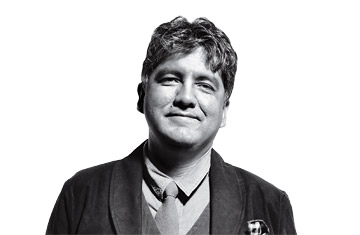
In the first story of your book Blasphemy, the narrator says, "Whenever an Indian says he's traditional, you know that Indian is full of s — -." Really?
Yes. When you're colonized, you end up exploiting your own spirituality. You're subject to so many negative stereotypes, you embrace the positive ones. Non-Indians love us in that way. They think we're all priests and healers. After generations of being reviled and dehumanized, to be thought of as magical is pretty seductive.
So, are you personally responsible for the Indian summer we're enjoying right now?
I showed up here and it got warm — although it was raining last night. I probably shouldn't have danced.
You write and speak about Native Americans, as you'd say, blasphemously. Most of your fans are white. Does that worry you?
It's so funny. Every reading I do, there's always some big Indian guy in the back row staring daggers at me. One guy in Montana said, "You're a genius. You figured out what white people wanted, and you wrote it." Yeah that's exactly what I thought back in 1987: What's going to make me really economically successful? Poems about Indian guys. I'm a capitalistic genius.
Have you written things that you've come to regret?
One poem. It dealt too much with real people and real circumstances. And now that book is out of print.
You said getting poetry published inspired you to stop drinking. Should we put out more poetry magazines?
Yeah, and they should all be called 12 Steps. I don't believe in magic, but I do believe in interpreting coincidence exactly the way you want. I woke up after a tremendous bender, and the acceptance for my first book of poems was in the mailbox. For me, it was a call to get sober.
Your father died of alcohol-related diseases. If he'd had early success, might he have had a different path?
I joke that my father was the only Indian of his generation who went to Catholic school on purpose. He was a star, athletically, academically, musically. He was the Coeur d'Alene jitterbug champion of 1959. But in that era, Indians didn't go to college. On my first book tour — I'm Sherman Alexie Jr. — all sorts of his former [non-Indian] schoolmates came to the readings expecting it to be my father. When I told them he was a randomly employed blue collar reservation alcoholic — the shock on their faces. It's a small American tragedy, replayed on reservations to this day.
Native Americans came out for Obama in '08. What about this time?
I think it's replicating the patterns in the country. The rural vote is Romney, and the urban vote is Obama. We're becoming red and blue inside the Indian world. Either that or Indians are just naturally drawn toward the color red.
In the two decades you've been writing about it, has life on the reservation changed?
I've spent very little time on my reservation in the last 20 years. Personally, there's too much pain. It's a haunted place for me. I meet my family in Spokane. I actually think I'm more traditional as a writing nomad than people who never leave the reservation.
Are you a fan of the casinos?
No. When an Indian tribe gets a casino, they've officially declared that they've lost the war. It's the final submission.
Who is your least favorite sports mascot?
People think this is a minor issue. Put images of Chief Wahoo and Sambo next to each other. This horribly racist depiction of African Americans looks exactly like the mascot of the Cleveland Indians. Exactly.
